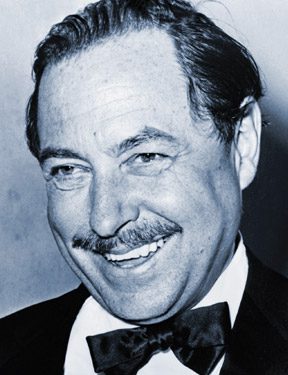- Tickets
- Memberships & Season
- Engage & Learn
- Your Visit
- Support
- Artists
- About
- Accountability
- Ticket Donation Requests
- Financials
- Rentals at the Goodman
- Our History
- Staff & Leadership
- Join the Goodman
- Press Room
- 2024-2025 Season
- 2023 – 2024 Season
- 2022 – 2023 Season
- 2021 – 2022 Season
- 2019 – 2020 Season
- Hershey Felder as Irving Berlin
- Goodman Gala
- A Paris Love Story
- Bernhardt Hamlet
- The Santaland Diaries
- American Mariachi
- School Girls; Or, The African Mean Girls Play
- Molly Sweeney
- graveyard shift
- Roe
- 42nd Annual Production of A Christmas Carol
- Dana H
- Daughter of a Cuban Revolutionary
- New Stages Festival 2019
- 2018 – 2019 Season
- 2017 – 2018 Season
- 2016 – 2017 Season
- 2015 – 2016 Season
- 2014 – 2015 Season
- About the Goodman
Artist Bio

Tennessee Williams
Thomas Lanier Williams was born on March 26, 1911 in Columbus, Mississippi. His mother Edwina was the daughter of an Episcopal clergyman; his father Cornelius worked as a traveling shoe salesman. He had an older sister, Rose, and a younger brother, Dakin. A shy, sickly boy despite his devotion to dancing and swimming, Williams grew up in St. Louis, where the family moved in 1918. He began writing at the age of 12 and by his later teens, his short stories were appearing in little magazines. In 1929 he entered the University of Missouri but left before his senior year. He worked days as a clerk for his father’s shoe company and spent his nights writing. Several of his early plays were produced by amateur theaters in St. Louis. In 1937 he re-entered college, attending the playwriting program at the University of Iowa, and he earned a B.A. in 1938.
Williams left St. Louis for New Orleans in 1939, the same year he first used the name Tennessee, to sign a story published in Story Magazine. He later gave various reasons for the name: that it was a college nickname, or that it honored his Tennessee ancestors. That same year four of his short plays won him $100 in a Group Theatre playwriting contest, which in turn led to his being represented by the noted agent, Audrey Wood, and to a $1000 award from the Rockefeller Foundation. In 1940 New York’s Theatre Guild undertook to produce his play, Battle of Angels, but it closed during tryouts in Boston. Williams reworked the play several times before it appeared on Broadway in 1957.
Audrey Wood found Williams’ scriptwriting work in Hollywood during the early 1940s, but Williams spent much of his time traveling the country (a heart condition kept him out of World War II). His big break came when The Glass Menagerie, a play that Williams had begun as a filmscript, opened in Chicago’s Civic Theatre to excellent reviews. The play opened on Broadway three months later and permanently established Tennessee Williams as one of America’s best playwrights.
In 1947 Williams met Frank Merlo, a young Sicilian-American ex-sailor in New Orleans. By the fall of 1948, Williams had fallen in love, and the pair began a relationship that lasted until Merlo’s death 14 years later. Williams wrote The Rose Tattoo during the happy first months of their relationship and the play reflects Merlo’s Sicilian background. Williams nicknamed his friend “Little Horse.”
From the 1940s to the early 1960s, Williams plays appeared regularly on Broadway: A Streetcar named Desire (1947), The Rose Tatto (1951), Camino Real (1953), Cat on a Hot Tin Roof (1955), Sweet Bird of Youth (1959) and The Night of the Iguana (1961), Many of his plays were turned into films, and both his plays and movies provided an astonishing number of starring roles for a generation of actors: Marlon Brando, Laurette Taylor, Anna Magnani, Elizabeth Taylor, Paul Newman, Jessica Tandy, Burl Ives and others.
Among Williams’ other writings are the plays, Period of Adjustment (1960), The Milk Train Doesn’t Stop Here Any More (1963), Vieux Carre (1977), A Lovely Sunday at Creve Coeur (1979), and A House Not Meant to Stand (premiered at the Goodman in 1982); the novel The Roman Spring of Mrs. Stone, two volumes of poetry, and the autobiographical Memoirs (1975).
Tennessee Williams died in February, 1983 in his New York hotel room, after apparently choking on the cap of a bottle of medicine.






















